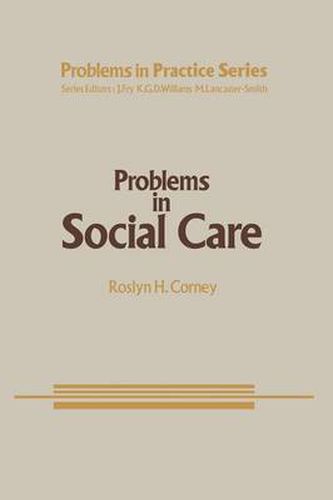Readings Newsletter
Become a Readings Member to make your shopping experience even easier.
Sign in or sign up for free!
You’re not far away from qualifying for FREE standard shipping within Australia
You’ve qualified for FREE standard shipping within Australia
The cart is loading…






This title is printed to order. This book may have been self-published. If so, we cannot guarantee the quality of the content. In the main most books will have gone through the editing process however some may not. We therefore suggest that you be aware of this before ordering this book. If in doubt check either the author or publisher’s details as we are unable to accept any returns unless they are faulty. Please contact us if you have any questions.
This book has been written primarily for general practitioners; it describes the social problems which are presented by patients to their doctors for help and advice. The aim of the book is to help the doctor manage these problems, both through his own interventions and by involving or referring the patient on to other agencies. While the more common problems have been considered in detail, those rarely encountered have been omitted. The book also concentrates on help available from non-medical sources, as these will be less familiar to the general practitioner than other medical or nursing services. There is often a close association between social difficulties and health problems, both physical and psychiatric. It is, there fore, vital that an attempt is made to meet the social needs of patients in order to promote good physical and mental health. R. H. Corney 8 Series Foreword This series of books is designed to help general practitioners. So are other books. What is unusual in this instance is their collect ive authorship; they are written by specialists working at district general hospitals. The writers derive their own experi ence from a range of cases less highly selected than those on which textbooks are traditionally based. They are also in a good position to pick out topics which they see creating difficulties for the practitioners of their district, whose personal capacities are familiar to them; and to concentrate on contexts where mistakes are most likely to occur.
$9.00 standard shipping within Australia
FREE standard shipping within Australia for orders over $100.00
Express & International shipping calculated at checkout
This title is printed to order. This book may have been self-published. If so, we cannot guarantee the quality of the content. In the main most books will have gone through the editing process however some may not. We therefore suggest that you be aware of this before ordering this book. If in doubt check either the author or publisher’s details as we are unable to accept any returns unless they are faulty. Please contact us if you have any questions.
This book has been written primarily for general practitioners; it describes the social problems which are presented by patients to their doctors for help and advice. The aim of the book is to help the doctor manage these problems, both through his own interventions and by involving or referring the patient on to other agencies. While the more common problems have been considered in detail, those rarely encountered have been omitted. The book also concentrates on help available from non-medical sources, as these will be less familiar to the general practitioner than other medical or nursing services. There is often a close association between social difficulties and health problems, both physical and psychiatric. It is, there fore, vital that an attempt is made to meet the social needs of patients in order to promote good physical and mental health. R. H. Corney 8 Series Foreword This series of books is designed to help general practitioners. So are other books. What is unusual in this instance is their collect ive authorship; they are written by specialists working at district general hospitals. The writers derive their own experi ence from a range of cases less highly selected than those on which textbooks are traditionally based. They are also in a good position to pick out topics which they see creating difficulties for the practitioners of their district, whose personal capacities are familiar to them; and to concentrate on contexts where mistakes are most likely to occur.